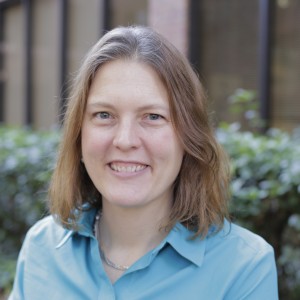Preparing students in online literacy education and practice is becoming increasingly important as children grow up in an overwhelmingly digital world. Through research, Angela Kohnen, assistant professor in the area of literacy and English education, hopes to create a comprehensive curriculum to ensure our students are prepared for their futures in an inevitably online world.
Kohnen is the most recent recipient of the B.O. Smith Professorship, a prestigious position appointed to promising professors seeking promotion and conducting relevant research. Professorships are granted for two years and include $20,000 in funding and salary.
For Kohnen, her lifelong love of learning is what sparked her transition into education and her desire to become a high school English teacher. Her experience in the classroom encouraged her to move up into higher education and eventually research. Her research has always been unified by an interest in the connections between literacy and identity, particularly for teachers and students in school settings.

Angela Kohnen
“The implementation of this research is what makes the College of Education an academic leader.”
“The Smith Professorship is really about impacting teacher practice, impacting classrooms, so it felt like a good fit to be able to use the funds to provide stipends and release time for teachers so we could talk more, develop curriculum and pilot lessons.”
Kohnen is currently working with eighth-graders and their teachers at P.K. Yonge Developmental Research School to understand how to best prepare students to be digitally literate across multiple content areas.
“The more we did try to help middle school students think critically about social media and Google searches, we started to realize a lot of the issues students were having weren’t just language arts types of issues, they were having trouble making sense of graphs, scientific content and historical content.”
Kohnen and her team of doctoral students visit the school once a quarter and test lessons involving information literacy. After testing the lessons, she works with the teachers to analyze the data they’ve collected and understand how it’s impacting students.
“Anyone who’s worked in a school knows the first time you do something, you make a long list of things you want to do differently next time. We’ve got a whole lot of stuff we want to adjust.”
With a background in English education, it’s exciting for Kohnen to collaborate with teachers across content areas.
“It’s not often that you get to see what’s going on in these other fields and bring everything together. These students aren’t just hearing about thinking critically in English class one time, they get to think and hear about it across content areas.”
Kohnen has visited the school a total of six times and will continue to visit throughout the rest of her professorship to continue testing different iterations of her lessons. She hopes to conclude her study with a set of well-tested activities aimed at increasing information literacy for eighth-grade students. She believes this has the potential to be spread to an even wider group of educators to help a large population of students.
“The implementation of this research is what makes the College of Education an academic leader.”






